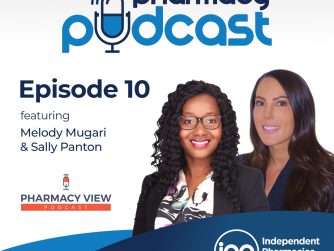In this episode of Pharmacy View Podcast’s Full Scope Pharmacy Leadership stream, host, Chantelle Turner, a Pharmacist Leadership and Business Coach at TURN Pharmacy Leadership, is joined by Sherri Barden, Pharmacist and Asthma Educator at Moama Village Pharmacy. Listen to this episode to explore the transformative journey of implementing specialized fee-for-service asthma and hay fever clinics, uncovering the challenges and triumphs that shape the evolving landscape of patient-centered Pharmacy care. And also discover the power of empathy, community engagement, and strategic communication in fostering meaningful connections and driving impactful change within the Pharmacy sector.
With over three decades in Community Pharmacy, Sherri has developed successful fee-for-service asthma and hay fever clinics and consults with other Pharmacies to implement similar programs. Growing up in a small farming community near Moama, New South Wales, Sherri’s passion for improving patient understanding and adherence to medication led them to establish asthma and hay fever education clinics and provide consultancy services for respiratory medicine in other Pharmacies.
Despite challenges, including patient reluctance and staff mindset shifts towards paid services, Sherri remains committed to proactive patient education and effective healthcare services, emphasizing the crucial role of communication and staff empowerment. They share insights into the strategic implementation of fee-for-service models, tailoring approaches to individual Pharmacy capacities and staff comfort levels. Sherri highlights the importance of community engagement and effective marketing strategies to promote clinic services, emphasizing the impact of patient relationships and community engagement on Pharmacy success.
Additionally, Sherri provides valuable insights into creating and implementing effective hay fever and asthma clinics, stressing the significance of utilizing resources from organizations such as Asthma Australia and the National Asthma Council. They emphasize the importance of proper medication usage, technique, symptom monitoring, and the potential for cross-referrals to other Pharmacy services. Sherri also underlines the importance of transparency and patient consent in creating an ideal Pharmacy environment, as well as the powerful role of empathy in fostering Patient-Pharmacist relationships and cultivating a compassionate work environment.
Topics Covered
- Fee-for-service asthma and hay fever clinics in Community Pharmacies
- Challenges faced in proactive patient education
- Strategies for effective communication and staff empowerment in the Pharmacy setting
- Importance of community engagement and marketing for promoting clinic services
- Building comprehensive treatment management plans
- Significance of cross-referrals
- Role of transparency and patient consent in fostering a collaborative and inclusive Pharmacy environment.
- Impact of small, informative conversations on patient understanding and management of respiratory conditions
- The crucial role of empathy in cultivating strong patient-pharmacist relationships
Key Quotes (Time Stamps)
- “I worked in many retail Pharmacies throughout Victoria, New South Wales, and Queensland and always had a particular interest in atopic conditions because my family was very atopic, so I would always be involved with the health promotion weeks for asthma week, for heart week; but only for asthma week and heart week.” (2:41 – 3:04)
- “I was passionate about not only the information about the medication but also the condition itself and the statistics around compliance and adherence and poor use of technique. I was very passionate about improving patients’ ability to understand their condition and their medications and why we need to understand that to improve our condition.” (3:05 – 3:36)
- “I did the Asthma Educator course, and then from there, I have been providing asthma education clinics within our Pharmacy for the past five years.” (3:57 – 4:04)
- “So, I gave the talk on that as well, and that sort of stemmed my real interest and thought about providing hay fever clinics within the Pharmacy. And it could be something very simple and effective. So, therefore, we launched our hay fever clinic in Pharmacy last year.” (4:35 – 4:49)
- “I’ve been thinking for the last few years about how I can help other Pharmacies implement these services as well. And that led me to set up my own little consulting business, and I’m just in the initiation. I’ve worked with two Pharmacies, one virtually and one face-to-face, to help them implement these services and improve.” (5:24 – 5:48)
- “I didn’t really know of any other Pharmacist that had done this before. So, it was all very new. I had to be creative, and I had to do strategic thinking.” (9:05 – 9:15)
- “I believe now that I’m starting up my own business and trying to really help other Pharmacies implement their own asthma clinics, I believe that can be even a short, condensed version of what I do within 15 minutes.” (10:01 – 10:14)
- “Obviously the most important thing is communication. And so, spending one on one time with each staff member and not just once, but actually even on a weekly-fortnightly basis, just to tap in to say how they going with that.” (11:28 – 11:43)
- “To really have that connection, that relationship with your team and your patients is very-very powerful. And it’s why you go to work to really get up in the morning and to enjoy what you’re doing as well is really important, very powerful.” (17:44 – 17:57)
- “In the ideal world, in the ideal Pharmacy, I would recommend asking for the patient’s consent. If a Pharmacy staff can sit in with the clinic champion and listen to a clinic, I think that’s very powerful.” (22:52 – 23:10)
- “In the ideal world, it would be great if you could get the patient’s consent to invite them into the clinic and have a listen. Just that transparency so everyone can see what’s going on. So, I think that’s really powerful as well.” (23:28 – 23:39)
- “There was a study done in Australian Pharmacies that shows, with allergic rhinitis and hay fever, that most patients self-select. So, 70 to 80% of patients self-select, and only 15% choose the right medication for them. And one in five Australians suffers from allergic rhinitis.” (24:50 – 25:14)
- “When our staff are educated and upskilled and informed, then, the confidence comes.” (25:28 – 25:33)
- “It’s just those little tiny conversations that can make a huge change in a patient’s life because we have to remember, at the end of the day, allergic rhinitis and asthma really affect a patient’s quality of life.” (26:14 – 26:25)
- “So, the one word for me would be empathy. I would put empathy in there, and the ability to understand and share the feelings of another is so important.” (30:35 – 30:50)
Social Media Clips (Time Stamps)
- Beyond Medication: The Heartfelt Mission of an Asthma Educator, Sherri Barden (2:10 – 6:20)
- Behind the Scenes: Unveiling the Challenges of Asthma Clinics with Pharmacist Sherri Barden (7:28 – 10:14)
- Fee-for-Service Evolution: Sherri Barden’s Strategy for Pharmacy Confidence (10:36 – 13:57)
- Community Connection: How Pharmacist Sherri Barden Elevates Clinic Awareness (15:10 – 17:57)
- Innovative Care Strategies: Crafting Comprehensive Clinics with Sherri Barden (18:03 – 22:10)
- Patient-Centric Learning: How Pharmacists Can Promote Transparency in Clinics (22:34 – 23:39)
- Quality of Life Matters: The Impact of Allergy Management (24:30 – 27:26)
- Heart of Healthcare: The Empathy Factor is Sherri Barden’s Prescription (29:37 – 31:18)
Useful Links
Moama Village Pharmacy | Website
Email Sherri Barden: sherribardenconsulting@gmail.com
Turn Pharmacy Leadership | LinkedIn
Turn Pharmacy Leadership | Website
Email Chantelle Turner: cs.turner@bigpond.com








